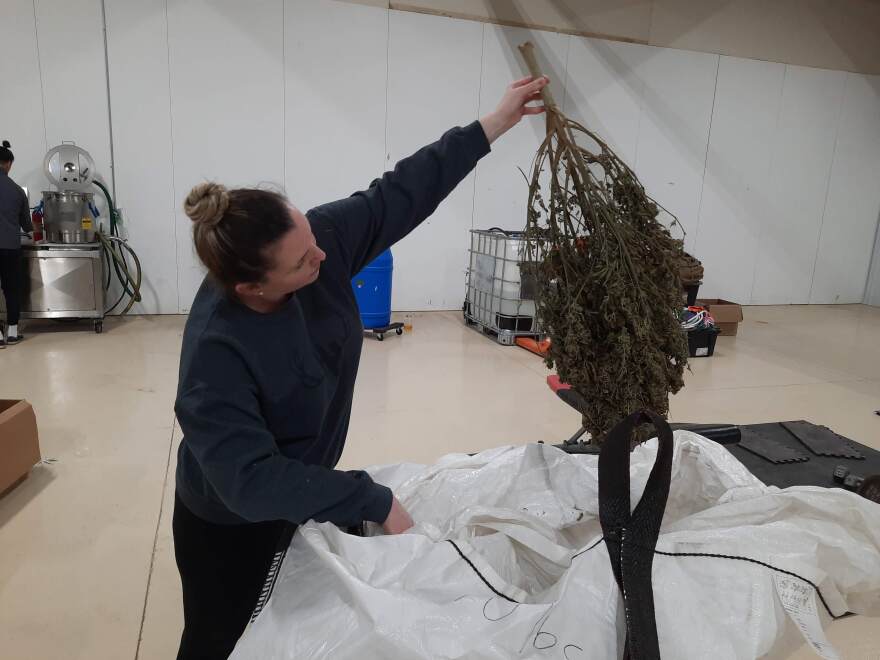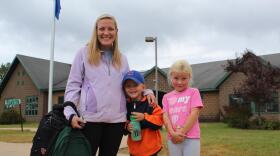On Tuesday, Joe Rivas walked up the creaky, wooden ramp to the hayloft of a decades-old, white-painted barn near Phillips.
Inside, hundreds of harvested cannabis plants hung on lines to dry.
The image was something like an upside-down Christmas tree farm.
Each is a variety of hemp, rich in the therapeutic substance cannabidiol, or CBD. They have little or no THC. That is, you can’t get high on anything grown here.

Steps away, inside the century-old farmhouse, Joe’s partner, Marisa Budej, tended to the seed-producing “mother” plants that will give life to this year’s crop. To spur growth, each was under intense light.
Elsewhere that day, at the couple’s processing space in the Phillips business park, Marisa opened giant white bags holding dried plants grown last year. At a glance, they looked something like the tumbleweed seen in old Westerns.

Each place plays a role in the hemp growing and drying process, the first steps Joe and Marisa use to make CBD products. The next steps are more mechanical, using machines to wash the leaves, extract and purify the CBD, then bottle it for use.
The signature product, which Joe and Marisa fully produce from seed to bottle, is CBD oil, packaged in little green containers and sent worldwide.

Getting into the CBD business required a combination of military service, personal experience, and happenstance.
Joe Rivas is an Army Green Beret, having served 24 deployments across the world.
When he came back to civilian life, he couldn’t shake PTSD-induced nightmares.
“It comes through time and wear and tear on somebody, especially in the military, the things that you don’t expect to dream about hit you ten years later. You’re like, ‘I totally forgot about that.’ You get stuck in these dreams and some of these events that happened to you,” he said.
Marisa watched Joe struggle through one fitful night after another.
“As a partner, it hurts you to see your partner hurt or hurting in any sort of way,” she reflected.
None of the traditional sleep aids ever seemed to work.
At a loss, Marisa finally picked up some commercial CBD, an extract from a plant related to marijuana, but without the THC compound that produces a high.
For the first time in a long time, Joe slept soundly and peacefully.

That experience was the start of their business, now named Rack Ops CBD, military slang for sleeping time.
Joe began sharing the product with other veterans suffering from nightmares and sleep problems.
He found that, because of his own background, little sales pitch was needed.
“Another combat veteran trusts a combat veteran, because there’s nothing to gain from telling you something isn’t what it is because a lot of these guys that are combat veterans, when you’re downrange, you’re at war, whatever you say, it is what it is,” Joe said.
Now in business for a few years, the feedback seems consistently positive.
Marisa read off an unsolicited text message that had come across from a stranger just that morning.
“Hi Joe, I came across your bio and product through some FourBlock connections awhile back. I took a chance on your CBD oil and it’s changed my life,” the user wrote. “Better sleep and improved clarity to focus on the day-to-day without having to resort to pills. I want to say thanks.”
The couple said that’s typical of what they hear from customers. They’ve made thousands of sales, all online to this point.
Slowly, Marisa said, any stigma attached to CBD is starting to fade.
“There’s a misconception with the plant. People think you’re going to get high off of it. This is not what we do. This is not what we do. This is medicinal. There is absolutely no THC in this. There is no psychoactive effect, period,” she said.

Rack Ops CBD is sold across the country and internationally, but its entire process takes place in Phillips.
It’s also a homecoming story and a story of farm rebirth.
The farmstead and barn, the place where the hemp is grown and dried, are where Marisa’s father grew up. He was the descendant of Czech immigrants that moved to the Phillips area.
Joe and Marisa had been longtime San Diego residents but came here to start an agriculture business of a different kind, one on land that last saw an operating farm years ago.
“We said, hey, you know what? We want to start a family, and the city’s not for us,” Marisa said.
What used to be pastureland now hosts 15 different plots of hemp growth.

Joe’s vision is that, someday, stores on every military base will carry Rack Ops CBD.
“My end state is I want Rack Ops in every ‘PX,’ Post Exchange, Base Exchange, in the world. There’s 1,500 stores in the world, and that’s where I want my product, is on the shelf,” he said.
He and Marisa are confident that their product will give servicemembers and veterans the relief they need from nightmares, no matter how much labor that requires them to give.
“It’s not the easy way. It’s not the cheap way, to do everything from seed to bottle,” Marisa said. “But it’s the important way for us. It means something to us.”
This year’s cannabis crop should go in the ground by mid-June.








